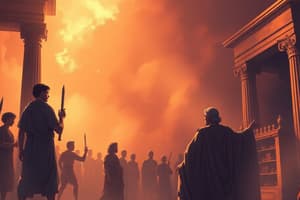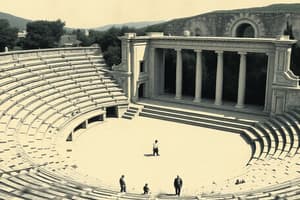Podcast
Questions and Answers
What is the term for the final resolution of the conflict in a plot?
What is the term for the final resolution of the conflict in a plot?
- Complication
- Denouement (correct)
- Climax
- Crisis
Who is responsible for overseeing the entire process of staging a production?
Who is responsible for overseeing the entire process of staging a production?
- Actor
- Dramaturg
- Director (correct)
- Playwright
What is the term for any clothing worn by an actor on stage during a performance?
What is the term for any clothing worn by an actor on stage during a performance?
- Diction
- Design
- Costume (correct)
- Dress rehearsals
What is the term for the stage area toward the audience?
What is the term for the stage area toward the audience?
What is the term for a signal, either verbal or physical, that indicates something else, such as a line of dialogue or an entrance, is to happen?
What is the term for a signal, either verbal or physical, that indicates something else, such as a line of dialogue or an entrance, is to happen?
What is the origin of the word 'drama'?
What is the origin of the word 'drama'?
What does the term 'antagonist' refer to in drama?
What does the term 'antagonist' refer to in drama?
What does the term 'catharsis' refer to in drama?
What does the term 'catharsis' refer to in drama?
What is the main aim of articulation in drama?
What is the main aim of articulation in drama?
What is 'center stage' in the context of theatre arts?
What is 'center stage' in the context of theatre arts?
What is the term for a short play that consists of only one act?
What is the term for a short play that consists of only one act?
In drama, what is the term for a long speech by a single actor?
In drama, what is the term for a long speech by a single actor?
What is the term for the area of the stage closest to the audience?
What is the term for the area of the stage closest to the audience?
In theater, what does 'breaking the fourth wall' refer to?
In theater, what does 'breaking the fourth wall' refer to?
What is the main focus of the document 'Feedback literacy, feedback seeking and lifelong learning: Implications for d...'?
What is the main focus of the document 'Feedback literacy, feedback seeking and lifelong learning: Implications for d...'?
Which document is related to 'CATCH UP FRIDAY READING'?
Which document is related to 'CATCH UP FRIDAY READING'?
What is the topic of 'Jennifer L.Peña In Media Res Media Component Practicing Over State Lines 1. 26. 24.pptx'?
What is the topic of 'Jennifer L.Peña In Media Res Media Component Practicing Over State Lines 1. 26. 24.pptx'?
Which document might contain information about the Barbush family?
Which document might contain information about the Barbush family?
Flashcards are hidden until you start studying
Study Notes
Theatre Terminology
- The term for the final resolution of the conflict in a plot is called the denouement.
- A production manager is responsible for overseeing the entire process of staging a production.
- Costume refers to any clothing worn by an actor on stage during a performance.
- The apron is the stage area toward the audience.
- A cue is a signal, either verbal or physical, that indicates something else, such as a line of dialogue or an entrance, is to happen.
- The origin of the word 'drama' comes from the Greek word meaning "to do" or "to act".
- An antagonist refers to a character in a play who opposes the protagonist or main character.
- Catharsis refers to the emotional purging or cleansing that the audience experiences during a dramatic performance.
- The main aim of articulation in drama is to speak clearly and effectively to convey emotions and meaning.
Theatre Spaces and Performances
- Center stage is the central part of the stage, often reserved for the most important scenes or characters.
- A one-act play is a short play that consists of only one act.
- A monologue is a long speech by a single actor.
- The downstage area is the part of the stage closest to the audience.
- Breaking the fourth wall refers to when an actor addresses the audience directly, breaking the imaginary wall between the stage and the audience.
Unrelated Documents
- The document 'Feedback literacy, feedback seeking and lifelong learning: Implications for d...' focuses on the main aim of feedback literacy.
- The document 'CATCH UP FRIDAY READING' is related to reading and catching up.
- The document 'Jennifer L.Peña In Media Res Media Component Practicing Over State Lines 1. 26. 24.pptx' is related to media components and practicing over state lines.
- A document related to the Barbush family might contain information about the family's history, genealogy, or personal stories.
Studying That Suits You
Use AI to generate personalized quizzes and flashcards to suit your learning preferences.




